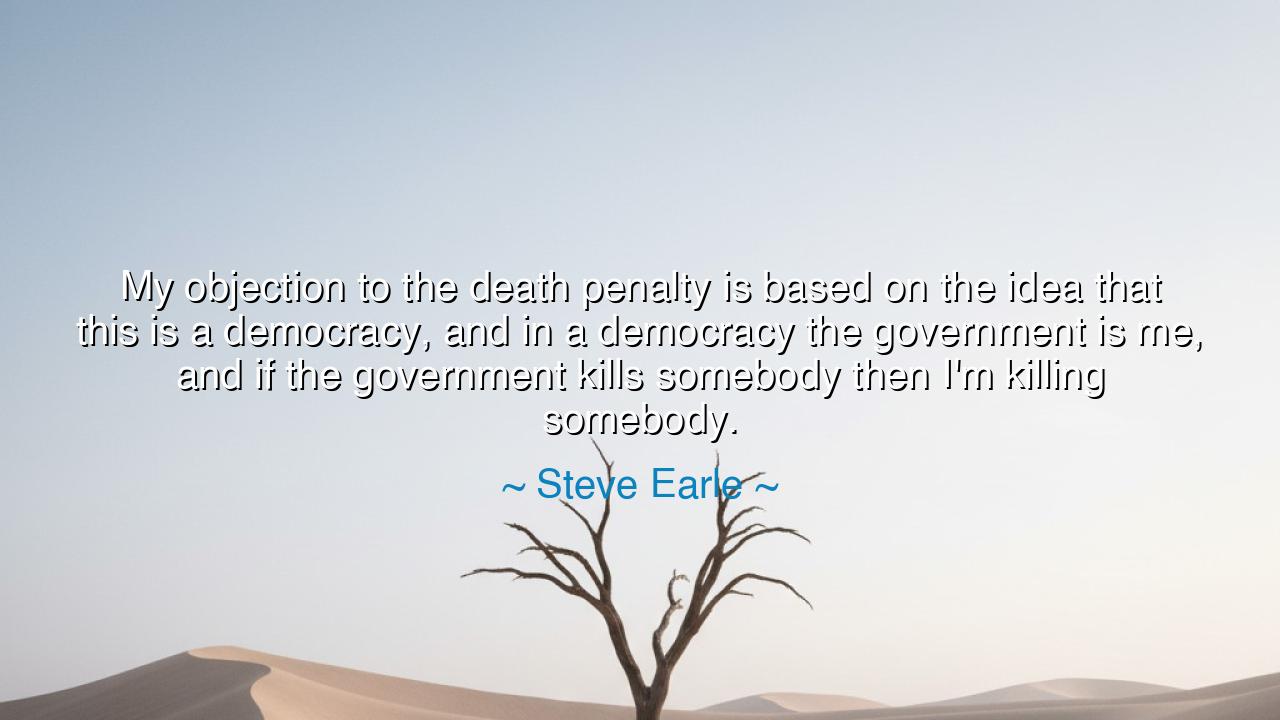
My objection to the death penalty is based on the idea that this
My objection to the death penalty is based on the idea that this is a democracy, and in a democracy the government is me, and if the government kills somebody then I'm killing somebody.






"My objection to the death penalty is based on the idea that this is a democracy, and in a democracy the government is me, and if the government kills somebody then I'm killing somebody." – Steve Earle
In these solemn and soul-stirring words, Steve Earle, the American musician and activist, gives voice to one of the deepest moral reflections of our age. His statement transcends politics and pierces straight into the conscience of citizenship. When he says, “the government is me,” he is not speaking metaphorically—he is invoking the sacred principle upon which democracy itself stands: that sovereignty belongs to the people. Therefore, if the government acts unjustly, its citizens cannot claim innocence, for the hand that signs the executioner’s order is, in truth, the collective hand of those who consent to its rule. Earle’s objection to the death penalty is not merely about crime and punishment; it is about moral responsibility, shared by every soul that lives under the flag of freedom.
The origin of this quote lies in Earle’s long opposition to capital punishment, especially after witnessing the execution of his friend, Jonathan Nobles, in 1998. Nobles, a man once condemned for murder, had found redemption in prison, and Earle’s encounter with him profoundly shaped his understanding of justice, forgiveness, and humanity. Having grown up in a nation that prized liberty, Earle came to see that democracy’s greatest strength is also its greatest burden: collective accountability. In a monarchy or dictatorship, power is distant; in a democracy, it is intimate. When the state takes a life, it is not an abstract machine performing an act—it is the sum of its citizens, acting in concert, whether through silence or consent.
In these words, Earle channels a truth known to the ancient philosophers and prophets alike—that justice, when detached from compassion, becomes cruelty in disguise. To the ancients, the virtue of a republic was measured not by its power to punish, but by its wisdom to forgive. In the Athens of old, Socrates, condemned by his own city, accepted death not in hatred, but as a lesson to all: that democracy can destroy itself when it confuses legality with righteousness. Likewise, Earle reminds us that when we, as citizens, permit the state to kill in our name, we inherit part of that blood. He asks: can a society that values life truly preserve its moral soul while practicing death as justice?
The emotional power of his words lies in their reversal of perspective. Most citizens think of the death penalty as something distant—a function of courts, juries, and laws. But Earle tears away that distance and forces each of us to look into the mirror of responsibility. “If the government kills somebody, then I’m killing somebody.” With that line, he transforms an institutional act into a personal one. He dissolves the illusion of separation between citizen and state. It is as if he stands before the gallows and whispers, “If you are silent, you too hold the rope.” His statement calls for the awakening of moral ownership—the realization that democracy is not simply a system of rights, but a constant reckoning of conscience.
Consider the example of Governor George Ryan of Illinois, who, in 2003, commuted the death sentences of every prisoner on the state’s death row after discovering that numerous wrongful convictions had been made. Ryan, a supporter of capital punishment for much of his career, came to see that the system was not only fallible but morally corrupting. “I could not risk killing an innocent person,” he said. In that moment, he embodied Earle’s philosophy: he recognized that his power to execute was also his power to bear moral guilt. It was not the failure of the courts alone that moved him, but the recognition that injustice carried out by the state is injustice borne by the people.
Earle’s objection thus becomes more than a protest against a policy—it becomes a meditation on the sanctity of human life and the moral cost of democracy. To live in a free nation is to share in its victories and its sins alike. The power that allows citizens to vote, to speak, to build, also binds them to the consequences of what their government does in their name. To ignore this bond is to abandon the very essence of democracy: the belief that government is not some distant power, but the reflection of the people’s collective will.
The lesson of this quote is profound and eternal: freedom demands conscience. To be a citizen is not merely to enjoy liberty, but to carry the weight of responsibility for how that liberty is exercised. The true test of a democracy is not in how swiftly it punishes, but in how deeply it values mercy. If we allow the state to destroy life without reflection, we diminish the sanctity of our own. Earle’s words call us to awaken—to question, to feel, to act—not from anger, but from reverence for life itself.
So let his voice echo in the hearts of all who cherish freedom: you are the government; your silence is consent, your action is justice, your compassion is law. And when you stand before the moral choices of your age, remember that every act of your nation bears your signature. For democracy, as Earle reminds us, is not merely a system—it is a mirror—and in it, we see both the greatness of our ideals and the gravity of our choices.






AAdministratorAdministrator
Welcome, honored guests. Please leave a comment, we will respond soon